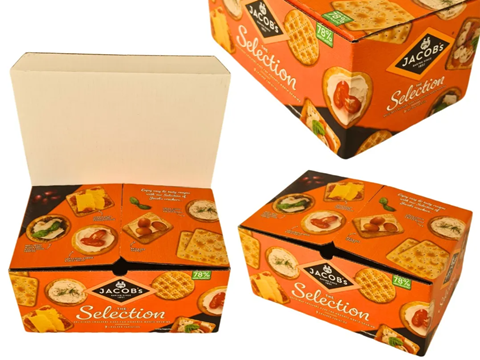
With help from DS Smith, Pladis claims to have reduced 78% of plastic – and, with it, over 373,248kg of CO2 so far – from its Jacob’s Cream Crackers box while retaining its tamperproof seal.
Motivated by increasing retailer and consumer demand for sustainability-minded solutions, Pladis reached out to DS Smith in hopes of developing new packaging for its Jacob’s Crackers Selection pack that would minimize the amount of plastic in the shell of the packaging without sacrificing its tamperproof elements.
Designers at DS Smith have reportedly tested the resultant pack. It is now said to contain 78% less plastic and saved over 373,248kg of CO2 to date, while simultaneously achieving recyclability and meeting the same standards of print quality as the previous box.
To redesign the pack, DS Smith utilized its Circular Design Metrics, which rate and compare a packaging design’s circularity across eight different indicators. Apparently, they have enabled the company to present around 3,000 ‘circular-ready’ projects to its customers every month.
“The challenge with attempting to cut plastic out of packaging often means it can compromise the design,” said Paul Bridge, Cluster D&I manager at DS Smith. “By applying our unique Circular Design Metrics, we came up with a solution that ensured that we ended up with a finished product that had 78% less plastic.”
David Guy, packaging director at Pladis UK&I, added: “We were delighted to work with DS Smith, and they really hit our brief, finding a solution which worked with our current manufacturing set-up without compromising on branding.”
The new Jacob’s Cream Crackers box is now available on-shelf.
It is expected to feed into DS Smith’s Now and Next strategy, which includes designing waste and pollution out of packaging, keeping materials in use, and decarbonizing its operations and value chain.
In a specific example, it intended to reduce or remove one billion pieces of primary or secondary plastic packaging from its consumer goods by 2025 – a target that the company has just surpassed across its European and North American markets, replacing a reported 1.2 billion pieces of plastic sixteen months in advance.
Sainsbury’s has made a similar development by selling its own-brand chicken and fish line in kerbside recyclable cardboard trays. In total, the trays are expected to save 694 tonnes of plastic annually, with the new own-brand salmon fillet trays specifically set to cut plastic by 70%.
WestRock and Liberty Coca-Cola Beverages also plan to replace around 200,000 pounds of plastic rings used in multipack bottled drinks with recyclable paperboard carriers, having successfully installed new equipment at the bottler’s production facility in Philadelphia.
If you liked this story, you might also enjoy:
How are the top brands progressing on packaging sustainability?
The ultimate guide to global plastic sustainability regulation














No comments yet